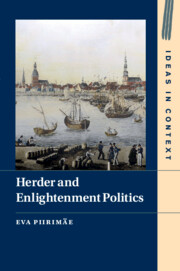Book contents
- Herder and Enlightenment Politics
- Ideas in Context
- Herder and Enlightenment Politics
- Copyright page
- Contents
- Preface
- Acknowledgements
- Note on Translations
- Abbreviations
- Introduction
- Chapter 1 Republics, Monarchies and the Philosophy of Human Society
- Chapter 2 Rousseau and the Origins of the ‘Current Malaise of the World’
- Chapter 3 Montesquieu’s System and Reforms in Russia
- Chapter 4 The Bildung of Humanity and Modern Virtue
- Chapter 5 German Freedom and Modern Liberty
- Chapter 6 The Vocation of Poets, Pastors and Philosophers
- Chapter 7 State-Machines, Commerce and the Progress of Humanität in Europe
- Chapter 8 Perpetual Peace and Purified Patriotism
- Conclusion
- Epilogue
- Bibliography
- Index
Chapter 2 - Rousseau and the Origins of the ‘Current Malaise of the World’
Published online by Cambridge University Press: 30 March 2023
- Herder and Enlightenment Politics
- Ideas in Context
- Herder and Enlightenment Politics
- Copyright page
- Contents
- Preface
- Acknowledgements
- Note on Translations
- Abbreviations
- Introduction
- Chapter 1 Republics, Monarchies and the Philosophy of Human Society
- Chapter 2 Rousseau and the Origins of the ‘Current Malaise of the World’
- Chapter 3 Montesquieu’s System and Reforms in Russia
- Chapter 4 The Bildung of Humanity and Modern Virtue
- Chapter 5 German Freedom and Modern Liberty
- Chapter 6 The Vocation of Poets, Pastors and Philosophers
- Chapter 7 State-Machines, Commerce and the Progress of Humanität in Europe
- Chapter 8 Perpetual Peace and Purified Patriotism
- Conclusion
- Epilogue
- Bibliography
- Index
Summary
This chapter discusses Herder’s Fragments: On Recent German Literature. In this work, Herder provided a comprehensive ‘patriotic’ assessment of the current situation of the German language and literature, including also excerpts from several smaller essays on the origins of poetry, language, and society. Previous scholarly discussions have mainly focused on Herder’s evolving historicism, aesthetics or philosophical hermeneutics as set out in these early essays. However, it is not sufficiently acknowledged that Herder’s theory of German linguistic and literary patriotism rested on a philosophical history of humanity, which he devised in dialogue with several other such histories. Engaging with Iselin’s and Goguet’s ideas, Herder sought to provide a response and alternative to Rousseau’s account of early human history. His own account closely paralleled that of John Brown. Both Brown and Herder traced all human culture and politics back to humans’ original creative agency, while Herder also drew rather optimistic conclusions from this. If it was the human capacity for poetry that demonstrated the dignity of human nature and had, from the earliest times, sustained human societies, one could hope that some form of poetry could also supply a remedy to the ‘current malaise of the world’.
- Type
- Chapter
- Information
- Herder and Enlightenment Politics , pp. 63 - 96Publisher: Cambridge University PressPrint publication year: 2023

